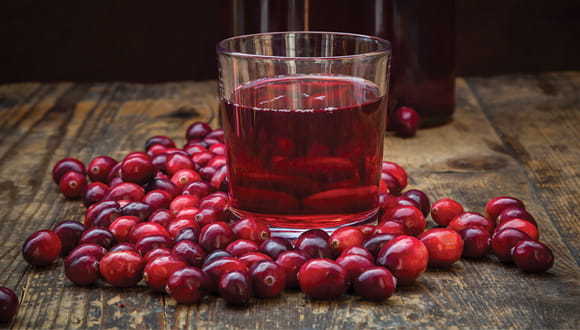UTI Home Remedies: Does Cranberry Juice Really Help?
Nov. 4, 2021 - Katie McCallumIf you have a urinary tract infection (UTI), you want it gone ASAP.
UTI symptoms aren't just inconvenient and annoying, they're downright uncomfortable — with notable ones including a frequent urge to urinate and a burning sensation, or even pain, as you do. Having to deal with these symptoms is common, especially for women.
What's more, UTI recurrence can be fairly common too. The chance of a UTI cropping up again within six months falls just shy of 25% for women between the ages of 18 and 40.
So if you get them frequently, you're likely looking for ways to prevent the next one.
Cranberry juice is a classic UTI home remedy. In fact, maybe the only reason you even stock the juice in the fridge is because you get such infections often — or when you feel one coming on. If you can't stand the sour taste of cranberry juice, you might be thinking about trying a cranberry pill or tablet instead.
But can cranberries, whether the fruit itself, juice or a supplement, actually help relieve or prevent UTI symptoms?
Cranberry juice for a UTI: Does it really work?
Maybe you're looking for a way to avoid taking antibiotics. Or maybe you just want to take some sort of immediate action to relieve your symptoms as you wait to see your doctor.
Regardless, how might cranberry juice be of use against UTIs?
For starters, the bad news is that cranberry products likely don't help with a UTI once it's already developed. No studies have shown that drinking cranberry juice or taking a cranberry supplement actually works to treat UTIs. Darn. This means you need to visit your doctor if you already have an infection.
As for whether cranberries can prevent a UTI from developing in the first place, the evidence is mixed, and the exact mechanism by which they might help isn't totally clear either.
One prominent theory is that a substance in cranberries, called proanthocyanidins, might help prevent UTI-causing bacteria from sticking to the walls of the bladder and other urinary tract linings. If bacteria can't stick, they're likely to get flushed away the next time you use the bathroom instead. Infection averted.
Makes sense in theory, but what about in practice? Is cranberry juice really an effective way to prevent a UTI? Some studies show a small benefit, while most show none at all.
For instance, a review of 24 large studies investigating cranberry products for UTIs concluded that neither juice nor supplements significantly reduce a person's risk of experiencing an infection.
And even in the few smaller studies that have shown some UTI prevention benefit for cranberry products — cranberry juice, primarily — it's important to note that many participants dropped out or ultimately failed to comply. This suggests that the frequency or amount of cranberry juice needed to achieve this small benefit may not be sustainable for many people.
Supplemental formulations of cranberry, including tablets and powders, might be more palatable than sour-tasting cranberry juice. But they contain differing amounts of proanthocyanidins. In some cases, the amount may not be enough. Without an effective dose, a cranberry product is even less likely to prevent bacteria from sticking to urinary tract linings.
Still, while the science doesn't seem to be there, there's likely no harm in using cranberry products to try to prevent a UTI. Just know that there isn't necessarily a benefit either.
If you do decide to regularly drink cranberry juice for UTI prevention, however, be sure to choose unsweetened cranberry juice from among the many blends containing substantial amounts of added sugar. And always consult your doctor before starting any supplement. You'll need to be sure that it doesn't impact any health conditions you may have or interfere with medications you're taking.
5 UTI prevention tips you might try instead
In summary, if you currently have a UTI, skip the cranberry altogether and schedule an appointment with your doctor instead. A mild UTI may resolve on its own, but antibiotics are sometimes needed to treat them.
And as mentioned, if you get UTIs frequently and are looking for ways to prevent your next one, unsweetened cranberry juice may help. But it might also not.
Here are five other ways to help reduce your risk of getting a UTI:
- Stay hydrated. Drinking plenty of water adds volume to your urine and helps ensure you're urinating often, helping to dilute and flush out UTI-causing bacteria. Both can reduce the risk of developing an infection.
- Be careful how you wipe after using the bathroom. If bacteria from the rectum relocate to the vagina or urethra, they can lead to an infection. Wiping from front to back can help prevent this.
- Try to urinate after having sex. Drinking a glass of water and using the bathroom may help flush out any bacteria. While the supporting evidence for this is somewhat limited, it certainly isn't harmful.
- Take steps to normalize your vaginal pH. Menopause can change a woman's vaginal pH, making it harder for good bacteria to survive and easier for UTI-causing bacteria to grow. If you're post-menopausal and are experiencing UTIs frequently, ask your doctor about whether vaginal estrogen might be needed to restore your vaginal pH.
- Change your birth control. Spermicide-treated condoms and diaphragms can lead to unwanted bacterial growth. If you're getting UTIs frequently and use one or both of these forms of birth control, consider choosing a different option.
Need care now?
Houston Methodist Virtual Urgent Care offers on-demand video visits from wherever you are, no appointment needed. Our board-certified providers are available 24/7 to address many common health issues.








